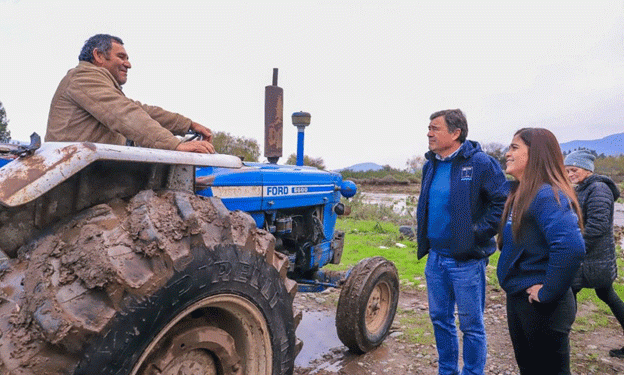Following intense rains, snowfalls, and river floods that recently struck Chile’s central-southern region, Minister of Agriculture Esteban Valenzuela has been actively monitoring the agricultural impact in the Metropolitan Region (RM). Despite the widespread weather disruptions, preliminary projections indicate that approximately 8,000 farmers have been affected, a reduction from last year’s damage.
Assessing the Damage
On June 24, 2024, Minister Valenzuela toured the provinces of Talagante and Melipilla, visiting the municipalities of Talagante, María Pinto, and Curacaví. The areas experienced significant damage to pastures, crops, beehives, and various agricultural infrastructures. The minister acknowledged, “The impact is less severe than last year, but some areas were hit hard. Here in María Pinto, as well as in San Vicente de Tagua Tagua and Arauco, 350 farmers have been affected.”
Valenzuela emphasized the importance of precise damage assessment, stating, “We are advancing with a very rigorous agricultural damage report, in collaboration with municipalities.”
Government Response and Support
Minister Valenzuela, alongside monitoring efforts in the O’Higgins and Biobío regions, outlined plans to support affected farmers. He highlighted the need for collaborative resource mobilization, involving discussions with Governor Claudio Orrego to secure necessary funding. The minister stressed, “Farmers cannot be abandoned; we must provide working capital, loans, and direct aid.”
María Pinto’s Mayor, Jessica Mualim, underscored the severity of the situation: “This area has been heavily impacted. The water saturation has destroyed crops, and it will be challenging to meet market demands on time. Hence, the support from various ministries, including Agriculture, Economy, and Social Development, is crucial.”
Coordinated Efforts for Recovery
Subsecretary of Social Services, Francisca Gallegos, added that effective implementation of the basic emergency report is underway to measure household and housing impacts. She noted, “We are working closely with the Ministry of Agriculture to resolve both social and economic issues in the affected areas.”
Gallegos emphasized the urgency of early aid, saying, “The recovery process is slow, but early assistance must be provided promptly to offer some reassurance to the affected families, as directed by President Boric.”
Sandra Saavedra, from the Presidential Delegation of Melipilla, confirmed their commitment to mitigation, repair, and prevention efforts. She stated, “We are supporting ministries and institutions to aid the most affected municipalities of María Pinto and Melipilla.”
Targeted Support for Farmers
Minister Valenzuela revealed that around 4,000 farmers in the Biobío and La Araucanía regions have also been affected. He explained that within the next three days, a thorough assessment will be conducted between the Ñuble Region and the Metropolitan Region.
He detailed the aid strategy: “There are two types of assistance: immediate aid, such as food for bees, chickens, and other livestock, and economic recovery bonuses. Last year, these ranged from one to five million pesos depending on the damage severity. This working capital is complemented by Indap and BancoEstado’s ‘Siembra por Chile’ loans.”
The coordinated efforts of various governmental bodies are vital in addressing the immediate needs and long-term recovery of affected farmers in the Metropolitan Region and beyond. The preliminary data suggests a less severe impact compared to last year, yet the focused assistance remains crucial for the hardest-hit areas. The resilience and support for the agricultural community will be essential in navigating these challenging times.
Error




